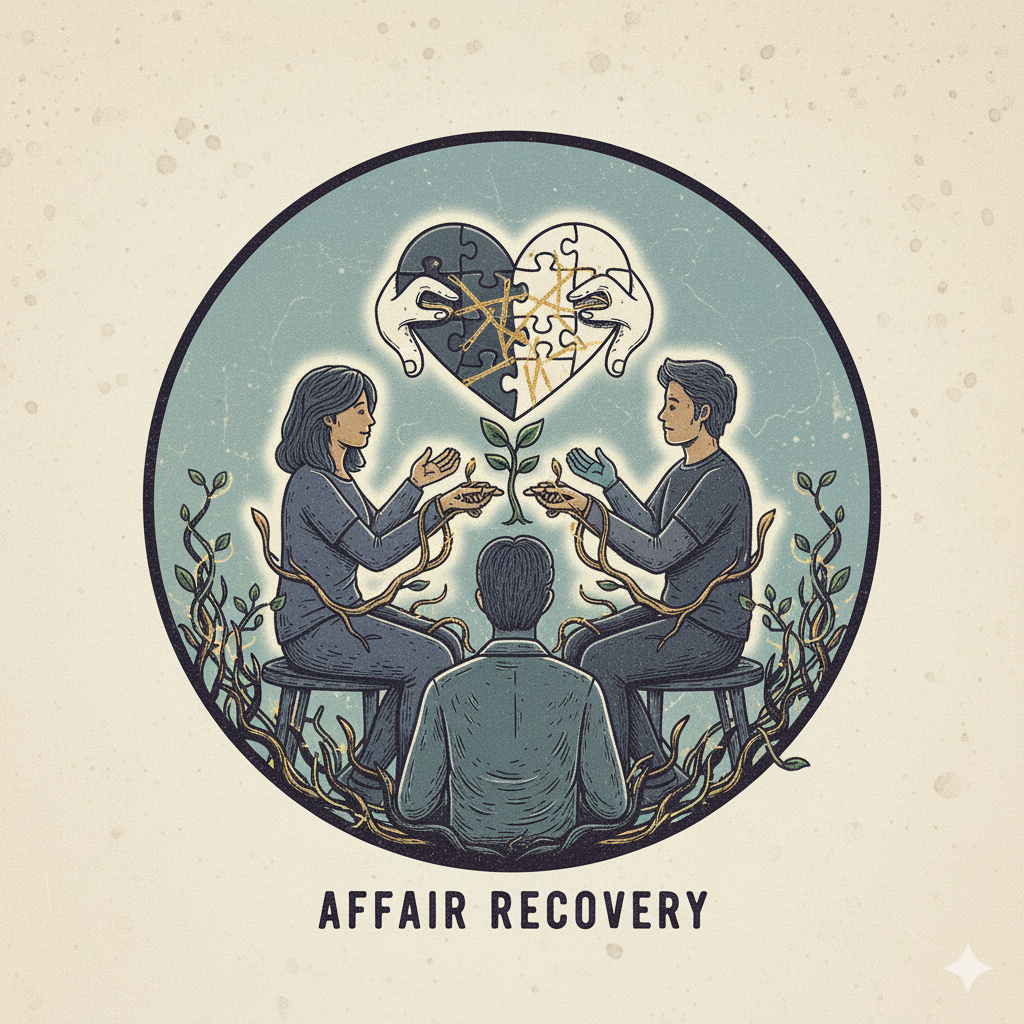“You found out your partner is having an affair.”
Infidelity Counselling & Affair Recovery in Singapore
“Your partner has been unfaithful, so you’re not sure if you can ever trust them again.”
Couple & Marriage Counselling for Infidelity & Affair Recovery in Singapore

You’re not sure if you even want to repair your marriage so you find yourself contemplating a divorce. For couples seeking guidance, professional affair recovery Singapore services can provide a clear path forward.
Finding out that your spouse has been having an affair can be devastating. It feels like your whole world is falling apart. The pain is unbearable and you’re tired of the lies and excuses. You might be feeling anxious, depressed, and confused. How did this happen? Not knowing where to turn or what you should do is painful and feels overwhelming, and you wonder how you can go on. You question everything you thought you ever knew about your spouse. And, you don’t know what to believe or trust anymore. Knowing that you need help but not sure what kind of help is right. Finding trusted infidelity counselling provides the support you need. Seeking affair recovery Singapore services can be the first step towards healing and moving past the betrayal.
Signs that Your Spouse May Be Cheating
While everyone wants to trust and believe their partner, there are telltale signs that your spouse may be having an affair. These signs include:
- secretive phone or computer usage
- your spouse refuses to share account passwords
- significant changes in appearance
- unable to reach your spouse for significant periods of time
- changes in your sexual relationship: having less sex because your spouse is focused on another person or increased sex due to trying to cover up an affair
- your spouse becomes hostile
- your friends seem to be uncomfortable around you
- sudden changes in your spouse’s work schedule
- unexplained charges on credit cards
- they seem distant and unaffectionate
- avoidance or deflection of the topic


The Betrayed Partner: Navigating Shock, Trauma, and Betrayal Trauma Therapy
Discovering a partner’s affair can be deeply destabilising, and in Singapore’s fast-paced, high-pressure environment, this shock can feel even more overwhelming. Many betrayed partners here struggle with balancing emotional turmoil while still functioning at work, caring for children, or maintaining public composure in a culture that often values privacy and restraint.
You may be wrestling with questions such as: Can I ever feel safe with my partner again? How do I know the affair has truly ended? What kind of transparency or accountability do I need to feel secure? What will rebuilding trust look like for us in the context of our marriage, family and everyday routines in Singapore? These concerns are common, and in infidelity counselling, we help you explore them with clarity and support. Our specialised affair recovery Singapore program is designed to address the unique blend of emotional turmoil and societal pressures couples face in this fast-paced environment.
Our first step is to acknowledge the trauma. Infidelity can trigger intrusive thoughts, anxiety, sleep disruptions, or a sense of identity collapse. Through counselling, we help you regain emotional stability, offering tools to regulate overwhelming reactions while providing a safe space to process your grief, anger and confusion.
We also support you in clarifying your needs — whether that means rebuilding emotional safety, setting boundaries, seeking transparency, or taking time to decide on the future of the relationship. In Singapore, many partners also worry about how family expectations or cultural norms might influence their decisions. We help you sort through these pressures so your choices are made with clarity and self-respect.
As you heal, we work with you to rebuild self-worth and allow space for meaningful recovery — whether that leads to reconciliation or moving forward independently. The focus is on helping you regain a grounded sense of self and a path toward emotional safety.
The Unfaithful Partner: Facing Guilt and Rebuilding Accountability
In Singapore, individuals who have been unfaithful often carry immense guilt, shame and anxiety — not only about their partner’s emotional pain but also about the potential consequences for their family, reputation, and daily life. Many worry about how their actions may affect their children, extended family relationships, shared financial commitments or even their stability at home and work.
You may be asking yourself: How can I show my partner they are safe with me again? What steps must I take to rebuild trust? How do I provide transparency without feeling overly controlled? What changes do I need to make in my behaviour so this never happens again? These are crucial questions, and infidelity counselling helps you tackle them with honesty and structure. When looking for effective professional guidance, remember that experienced affair recovery Singapore experts can provide the necessary framework for genuine accountability and reconciliation.
In counselling, we guide you toward meaningful accountability. This means moving beyond repeated apologies and beginning the deeper work of understanding your partner’s pain, the breach of trust that occurred, and the emotional repair required for healing. It involves staying present when your partner expresses anger or hurt, answering difficult questions with openness, and recognising that rebuilding security often requires patience and sustained effort.
We also examine the emotional, relational or situational factors that contributed to the affair — whether rooted in work stress, unmet needs, conflict avoidance, or long-standing communication breakdowns. This exploration is not about shifting blame but about gaining insight so genuine change can take hold. In Singapore, where many people juggle demanding careers, family expectations and societal pressures, understanding these underlying dynamics is especially important.
From there, we work with you to adopt consistent, trust-restoring behaviours: transparency with digital devices and schedules, proactive communication, emotionally attuned responses, and follow-through on commitments. Over time, these actions help your partner feel safe again and demonstrate your willingness to rebuild the relationship with integrity.
Healing after infidelity is a gradual process, but with sincerity and guided support, you can become a more accountable, secure and dependable partner — whether the relationship continues or transitions into a different form.



Couples Therapy After an Affair: A Path to Reconciliation in Singapore
Trying to navigate through the pain of infidelity is like swimming underwater in the dark. You want so badly to breathe, and you’re not sure where you are going, or whether you are moving forward or drowning. But, there is hope for you and your spouse after an affair. I have helped many couples with infidelity issues save their marriages and strengthen and improve their relationships. Healing from infidelity and betrayal takes time. However, it is possible if both of you are committed to mending your broken bond. You have to be willing to recommit to each other. I hear you and understand your pain. But, you can get through it, and I can help you take the steps needed with the right affair recovery Singapore programme.
It is possible to rebuild your trust and relationship after an affair.
This may be difficult to believe right now. We understand how painful it can be. After, it can feel like the foundation under your feet has suddenly and devastatingly shifted. Now, you don’t know what to do next. How to recover from this. Or, where to turn to for support. Is affair recovery even possible? You might feel lost, confused, alone, hurt, sad… any number of things. Or you might be too numb and shocked to even know how you feel. We understand. Therapy can help you to reconnect with yourself and each other. Maybe, find a way forward out of the mess and into the future. For general support on relationship issues beyond infidelity, you can explore specialized couple therapy services like those offered by Couple Therapy Singapore. We can hold the hope for you and your relationship until you are ready and able to hold it for yourself again.


We can hold the hope for you and your relationship until you are ready and able to hold it for yourself again.
Betrayals of trust are one of the most common reasons people come to a relationship therapy. Whether this is in the form of an affair or infidelity or some other trust breach, it is a blow to the relationship and the sense of self of the people in the relationship. Therapy can help you to feel solid in yourself again and can help you rebuild the relationship if that is what feels best for you. We will walk with you on your journey back to knowing and trusting yourself, and each other. Then, we will help you to process the pain and hurt and rebuild your foundation. We will offer the support, validation, and safety for you to walk through the pain and come out the other side.
The Affair Recovery Process: Steps for Healing
Recovery must begin with an absolute ending to the affair. All ties must be cut before the work can begin. Should the affair continue behind the scenes, in my experience, the relationship is very unlikely to succeed.
The second step to recovery is for the deceiver to ba able to move past defensiveness and guilt so they make talk openly and transparently about what happened. This is a time when the “guilty” party will have to be humble, acknowledge their wrong-doings, and answer their pertner’s questions.
Next, there must be a shared understanding of what led to the affair in the first place. Were there issues in the marriage that led to the affair? If so, these will need to be tackled.
In order for the deceived spouse or partner to be able to begin healing, they will need to feel genuine compassion from their partner for having caused them pain. There is typically a knee-jerk reaction to not want to accept the cheater’s apologies or compassion. This can be seen as a way to “get back.” But understand that doing so only holds you back from healing.
The person that was deceived will also need to explore all of their feelings surrounding the betrayal. Usually shock, rage, fear, sadness, and distrust are the main emotions a person will need to work through.
At a certain point, you both will beed to decide whether you will stay together. If you choose to, you will need to work on rebuilding trust.
As you can see, the process of recovery is a complex one and will require that you work with a marriage counsellor to help you navigate the strong emotions involved. But, through commitment and work, many couples can stay together and even have a stronger bond than they did before. This is why seeking expert guidance for affair recovery Singapore is essential.


FAQs About Our Infidelity Counselling in Singapore
Infidelity covers a wide range of extra-marital behaviors. This includes sexual affairs, purely sex-focused relationships, casual/anonymous encounters, “emotional affairs” (non-physical intimate connections), and “cyber-infidelity” (online actions).
No one knows, since there’s no guarantee that respondents to surveys are giving honest answers.
Male infidelity has always been very common, but women seem to be catching up in this regard — possibly due to increased economic independence and greater participation in the workforce.
We now live in an “age of transparency,” where infidelity is much more likely to be discovered. Among couples who see me for infidelity, most often it’s been discovered by text, email, or some other electronic data.
Every couple’s story is different. Sometimes an extramarital relationship can be motivated by something missing in your marriage, or by unresolved personal issues.
But infidelity can happen to happy couples too. It doesn’t necessarily mean there was anything wrong with your marriage. Sometimes infidelity can just be the result of a series of bad decisions.
That being said, if you find yourself being repeatedly unfaithful, there may be something in your emotional life that you need to pay attention to.
They conclude that the relationship “was all a lie.”
They assume the relationship is over. (In fact, most committed relationships survive infidelity).
Or they assume there’s something wrong with them for still wanting to stay in the relationship. (In fact, most people in this situation still choose to stay together).
They deny their infidelity. Or they admit certain parts, but not the whole thing. This can lead to much worse feelings of mistrust and betrayal when additional details are discovered.
The first objective is usually to come to an understanding of what happened, and to provide a safe space for each partner to express themselves about it.
Often I’ll encourage the betrayed partner to be clear about what specific conditions they might need in order to stay in the relationship. This gives the partner who’s been unfaithful a chance to demonstrate sincere repentance and commitment, and the betrayed partner a chance to “stand their ground” and advocate clearly for themselves.